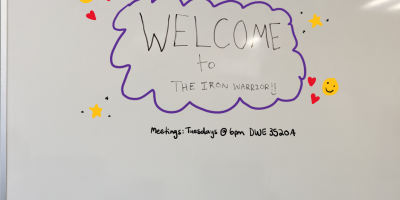Hello everyone! Wow does it feel weird to be writing this letter from the editor. It was less than two years ago that I went to my first meeting at the Iron Warrior, terrified that they would turn me away for having no journalistic experience. In hindsight, it was a very foolish fear, but I was a first year who had previously only ever spend one week alone in my life, and even then my parents had checked up on me every day. I had no idea how any of university worked. All I knew was that I had to study late into the night, join a bunch of clubs, and make a really awesome resume to have any chance of succeeding. As it turns out, the only thing that was true about that was that I had join some clubs—not for resume padding, but because clubs are awesome and fun.
And now two years later I am the Editor-in-Chief. It’s amazing how quickly it happened. I asked Leah about how she had gotten the position when she was EIC last fall, looking to see if I could eventually do it in 3B or 4A. As it turns out, the most important step is to ask. That being said, I haven’t really advanced that much since first year; I’ve been running around with my head cut off for the last few weeks, and it’s been everyone else in the team who really brought this paper together.
My assistant editor this term is Alex Lee. I’m excited to work with him again after—he was the first editor I ever worked under. Joanna Liu and Colin Evans are doing a great job as advertising managers, and both were quick to take up the role. A big thanks also goes to Anjida Sripongworakul and Sung Eun Kim, my web editors who waited so patiently for me as I tried to find the social media credentials, only to discover that you don’t actually need any to edit a Facebook page (who knew?). I also appreciate Vince Magas for taking on the role of circulation manager and thus the unenviable task of getting papers to V1 one way or another. Vince and Ethan Alter have also bravely taken up the role of photo editors, promising to go to any length to get that perfect shot.
In this issue, I recommend looking up Elizabeths’ column Too Much Information for some rather disgusting stuff including teeth. We also have an informative piece about the rising debt load in Canadian households on page 3, and if you’re looking for a new TV series to binge-watch then read Anjida’s new column Now Playing for some ideas. A huge thanks to the small army of copy editors and layout editors who showed up to help with layout weekend and keep me company, particularily Alex and Jessica who stuck it out all day Sunday. A special thanks to Sherwin, who learned the trade of crossword making in my time of need. As well, a congratulations to my Grandparents, who celebrated their fiftieth wedding anniversary last weekend. I love you both, and I am so sorry that I was stuck doing layout instead of there to celebrate with you.
One more shout-out is in order, and that is to Google Drive. Without it, organizing and managing this paper would be an absolute nightmare. It’s wonderful to be able to edit stuff from the comfort of my own room, and then crawl into E2 in the morning to put it into the paper. It’s great to have all the important documents at my fingertips, and it makes updating stuff before I forget a breeze. But just because it’s beneficial to have all my important files on hand anywhere with decent internet, doesn’t mean that everything is better when you add an internet connection.
I spent a fair amount of money on my computer. Partly it was to play video games, but partly it was because my laptop is my work station. With it, I can make projects and access my entertainment and work efficiently. I have all of my keyboard macros set up, and my files perfectly arranged in their very-hierarchal folder system. A lot of what I do involves internet, but as much as I can I make the internet services I use conform to my existing work flow.
I like my computer, and I’m familiar with all the software I have on it. So I wouldn’t want, for instance, to need an internet connection to view one of my textbooks. But that’s what I got when I bought a digital copy of “Calculus for Engineers” to save some money. I get that the publisher needs to verify that my copy of the book is legitimate. By all means make me download some sort of special software or check in every week to prevent the pdf from locking up. But don’t make me use a browser-based, single-page-at-a-time online textbook navigated by a mouse-only interface that scrolls off the top of the screen when I try to look at the bottom half of the page. And definitely do not tie my login credentials to a hyperlink on Learn so that I lose access to the textbook when all of the course notes are removed at the end of term. This is a textbook case of where everything could have been done fine without internet, and every bit of connectivity makes it a little worse.
The internet-mandated mindset has worked its way into a lot of other computer applications as well, especially smartphone apps. Some apps recognize the reality that not everyone has a data plan, and make an app which retains some functionality without internet. The most notable is my BBC news app, which automatically caches all of the text, but not the photos and videos. In a similar way, my reddit app of choice, Alien Blue, lets me continue to browse the last-opened thread; this is great for text subreddits like IAMA and AskReddit (although if I open too many other apps Alien Blue will close and loses its memory).
I’m very willing to accept that a lot of applications can’t operate to their full potential without internet. But as my two examples show, there are ways to provide a reduced service which is still really meaningful and useful. And there are some instances where the reduction of utility should be quite small. I was looking for a Pokémon clone last month to play on my bus ride to work, but all of the decent looking ones completely locked up without a wifi signal. For some reason I feel like I should be able to play these games without internet. Maybe it has something to do with foggy memories of originally playing them on a large turquoise brick that had a barely-usable infrared light emitter for device-to-device communication…
So I’ve made my case for the endemic issue of internet over-connectivity. I get that the world is very connected and that free wifi can always be found if you are desperate enough. But software that incorporates internet-free capability is a service which I really appreciate.
Particularly for smartphone apps, I appreciate the importance of internet for getting ads. I get that ads are a major revenue stream for many developers, and I take them any day over having to pay for something I’ll probably stop using within three days. I also understand that ads can’t really be cached; the data is retrieved as needed from the advertiser’s server, and the advertisers won’t pay if they can’t ensure that the ads are being shown. But offline capabilities are also a draw, and a way to stand out above the competition. If you offer an app I can use on the bus, I’m not going to switch to a different one as soon as I come into range of Eduroam; I’ll keep using it and viewing all the ads you send me. And let’s just say that if I had found a version of Pokémon that didn’t need wifi, I would be using it right now instead of jailbreaking my phone for the exclusive purpose of downloading GBA4iOS.




Leave a Reply